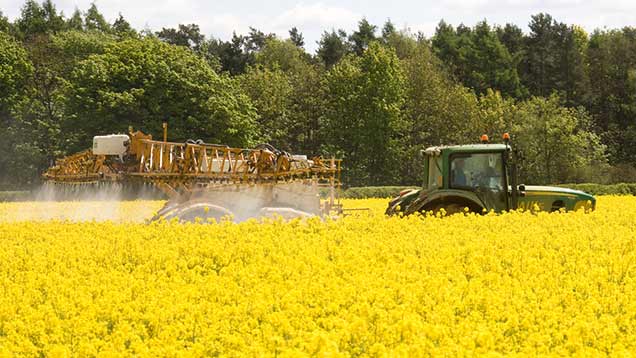Neonicotinoid ban ‘may be permanent’
 ©Tim Scrivener
©Tim Scrivener A two-year ban that prevents oilseed rape growers from using neonicotinoid pesticides may be made permanent, farm leaders have suggested.
Many growers battling to save rapeseed crops from pests such as cabbage stem flea beetle are hoping to use neonicotinoids again after a two-year moratorium expires in December.
But it now appears that the European Union ban may be here to stay.
An EU-wide mortatorium, which came into force in December 2013, restricts the use of imidacloprid, clothianidin and thiamethoxam on flowering crops.
See also: Emergency permission granted for neonicotinoids
The restriction was introduced amid claims that neonicotinoids could have a harmful impact on populations of honey bees and other pollinators.
Initially, it was expected that the ban would remain in place throughout the EU for two years.
Now it seems likely that the ban will remain for much longer – until Brussels deems there is compelling scientific evidence that it should be revoked.
NFU combinable crops board chairman Mike Hambly said he was initially of the opinion that neonicotinoid seed treatments were being suspended for two years.
But he warned: “The way they look at it now within Brussels is that it’s not coming back.”
The NFU continues to dispute the science behind the moratorium.
It argues that much of the research justifying the ban was based on artificial dosing studies, rather than what actually happens to bees foraging in neonicotinoid-treated crops.
Mr Hambly said the NFU was continuing to make the case for growers to be granted access to neonicotinoids. But he warned that doing so was “looking quite difficult”.
He added: “It is not the case that it is a two-year suspension and then it is suddenly going to appear on the market again.”
Earlier this year, the NFU successfully applied to Defra for an “emergency authorisation” allowing a limited number of oilseed rape growers to use neonicotinoids in areas at risk from flea beetle.
Mr Hambly said: “Crop protection is always a key issue for us.”
The application allowed Modesto and Cruiser seed treatments to be used on just 30,000ha of oilseed rape – about 5% of the national crop – in four counties in eastern England.
Mr Hambly said: “The emergency use authorisation that we gained was not as we liked but it was the best we could achieve.”
A call by environmental campaigners, including Friends of the Earth, for a judicial review of the Defra decision has so far yet to be granted.
Mr Hambly said the NFU hoped to make similar applications for rapeseed growers to use neonicotinoid treatments across a wider area in future years.
But he warned: “The pressure is still on and there are people fighting as hard as they can to make sure that we don’t get those emergency applications granted.”
The NFU was monitoring crops and recording damage by cabbage stem flea beetle in support of any future applications, said Mr Hambly.

